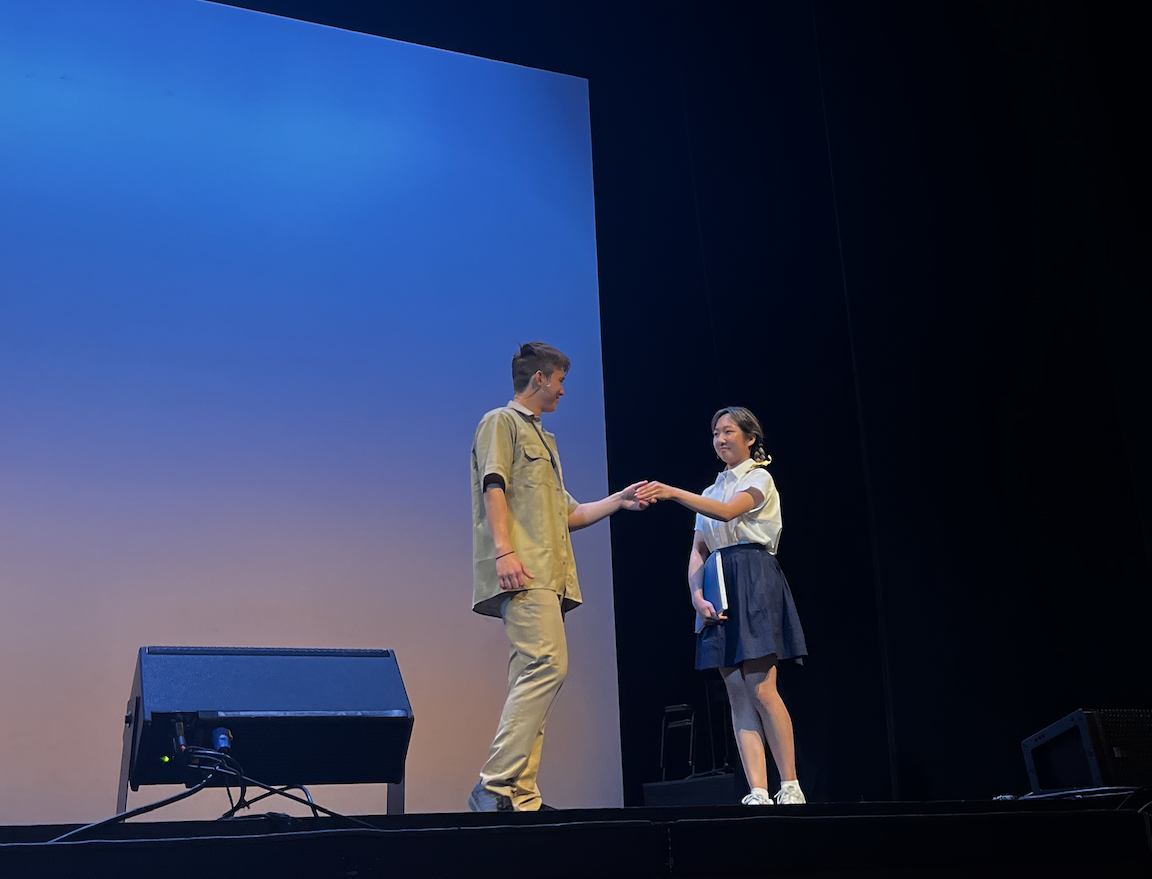UCLA’s Taiwanese American Student Association (TASA) presented “Make It With You” at Taiwanese Cultural Night (TCN) at Royce Hall on Thursday, April 20. The student-run stage production painted a story of two Taiwanese-American high school students. Apart from its budding romance, “Make It With You” weaves in intricate cultural themes of family, duty, independence and gender roles. The performance’s nuanced portrayal of the AAPI experience was deeply profound yet lighthearted at times, ringing true with many.
“”Make it With You” follows high schoolers George (played by second year opera major Leland Smith) and Grace (played by second year statistics major Catherine Tong) as they navigate family roles, academic commitments and their developing romantic relationship. Initially guided by the expectations of parents, siblings and friends, George and Grace eventually break free of these limitations and seize the opportunity to understand their identities beyond the confines of their families when they are both accepted to UCLA in their senior year.
The overall message of the night was to encourage one to step out of their comfort zone regardless of the repercussions. TCN demonstrated that even when it may seem like everyone is rooting against you, it’s important to stay true to yourself and your values.
Second year cognitive science major Jonathan Keung, who served as both the director and screenwriter of TCN, expressed his insights regarding the show’s themes.
“The theme of rising up and choosing your own path in the face of external pressures inspired [him] throughout the writing process,” Keung said.
In addition to overarching motifs of family, friendship and love, TCN wove in elements of the Taiwanese and American experience.
“After learning about my own family history, I felt inspired to tell the story of the sacrifices my family made to get us to where we are in America,” Keung said. “I was hoping to share something that related to everyone and inspired people to reach out to their own family.”
The dichotomy between George and Grace’s family dynamics in the very first and last scenes of the characters eating dinner demonstrates the nuanced complexity of the AAPI adolescent experience. Bound by differing family norms, George and Grace’s background varies in fundamentally different ways, such as their respective relationships with their parents (respectful and almost deferential, versus complex and turbulent). Yet their polarity ends up pushing them closer together, as their contrasts bring the best sides out of each other – Grace encourages George to invest more in academics, and Grace’s shyness melts away in the presence of George’s extroversion and sanguinity.
The music of TCN also was carefully chosen to bring the audience together. Two songs, 你好不好 (How have you been?) by 周興哲 (Eric Chou) and 向前走 (Move forward) by 林强 (Lim Giong), were featured that night: a popular song amidst modern Taiwanese individuals, and the other, a more classical Taiwanese song chosen for parents in the audience to end the night on a note of intergenerational connection.
This year’s TCN was the first performance after the COVID-19 pandemic, as the show took a hiatus with online learning and limited capacity auditoriums. Thus, a key obstacle was the lack of experience that TASA had in planning any kind of cultural night. All TASA board members who had once been involved in TCN had already graduated, and it seemed like having a Taiwanese cultural night would be extremely difficult to organize. However, fourth year computer science major Raeka Lin, the producer, worked hard to contact and facilitate communication with UCLA TASA alumni who had planned TCN in 2019.
“After going to another cultural night, I remembered how TCN was a thing before,” Lin said. “That night, I reached out to alumni and found out what it takes to put together TCN.”
In doing so, Lin helped to revive a long-established TASA tradition that the student organization hopes to continue upholding in the future.
The TCN cast and team’s nine months of hard work and numerous after-school rehearsals proved fruitful as audience members gathered in Royce Hall for the production. Unique elements of the night, such as a student-created TCN band or the combination of Mandarin and English in the script, brought elements of cultural authenticity and entertainment to a deeply personal show.
“TCN gave me a chance to immerse myself in Taiwanese culture,” Lin said. “I got to understand traditions that I might not be able to experience living in America. The TASA community helped me find that.”
Featured image by Amber Phung

Comments are closed.